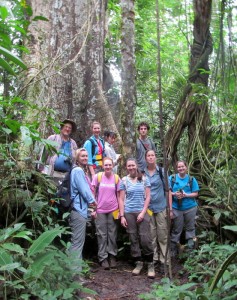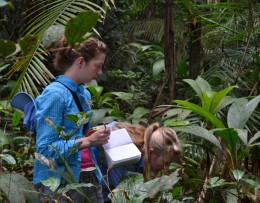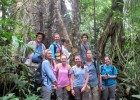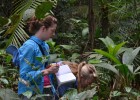
Wright State students in Suriname. Front row: Brittney Mitchell, Cortney Campbell, Jaclyn Klaus, Megan Harbaugh. Mary Bosworth. Back row: James Runkle(faculty), Alexandra Zelles, Denise Fong, Jonathan Ali.
Want to study abroad next spring? Check out this deal:
Fly into Cusco, Peru, high in the Andes Mountains and take a van down the cloud-shrouded eastern slope to a remote river, where an open boat carries you deep into the heart of a tropical rainforest.
For the next 12 days you sleep under a mosquito net in a thatch-roof lodge with no air conditioning and no cell phone service—no texts, no tweets, no status updates. Local entertainment includes parrots, macaws, toucans, exotic frogs and howler monkeys.
All for just $3,500, give or take. Interested? Better hurry: the Amazon Expedition Field Course to Peru only has eight slots, and they’re bound to fill up fast.
Well, maybe not.
“It’s surprising how few students end up applying,” Thomas Rooney, Ph.D., an associate professor of biological science, said after describing the two-week tropical ecology field course coming up in May 2013.
Rooney is organizing the course with Marcia Wendeln, senior lecturer and a longtime scholar of tropical rainforests. It will be the fifth annual field course in biological preserves in Ecuador, Peru and Suriname that Wendeln has led with Rooney or other faculty members.
During spring break this year, Wendeln and biology professor James Runkle, Ph.D., took six undergraduate and two graduate students to Suriname, a country in northeastern South America with one of the world’s largest and last intact rainforests.

Wright State students Alexandra Zelles (left) and Brittney Mitchell practice field research in a Suriname rainforest.
“We had tarantulas in our rooms and huge spiders,” said Jaclyn Klaus, then a senior and now a Wright State graduate student in earth and environmental sciences.
But the spiders kept their distance and turned out to be a small part of her experience. What stands out in her memory is their visit to a coastal nature reserve where the students witnessed the rare sight of a green sea turtle swimming ashore to lay eggs.
“Seeing an endangered species create life, and seeing how much work that mother put into making sure her eggs made it to shore and were safe, it was incredible,” Klaus said. She called it “an experience that will live with me forever.”
The sounds of the rainforest were as memorable as the sights for Alexandra Zelles. A graduate student from Chicago who is working on her master’s in biology with a concentration in ecology, Zelles said the raucous calls of howler monkeys beguiled her. “I just didn’t get enough. We saw them and heard them almost every day,” she said.
That’s the goal of these field courses for Wendeln, who has been visiting tropical rainforests herself for some 20 years. “It’s very satisfying for myself as a tropical biologist, but also as a teacher to have students so excited to see these endangered species and forests,” Wendeln said.
It’s no vacation. The course requires each student to execute a project while learning the basics of field research—observing, taking notes and writing a paper. In turn they get academic credit, which also allows them to use financial aid to help pay for expenses.
But the value of the experience on a student’s career can be priceless. “We’ve had students go on to graduate school who are now doing tropical research,” Rooney said.
It’s an opportunity that becomes rarer every year as rainforests lose ground to mining, logging and other human activities. “Rainforests are more under threat than a lot of other systems, so to see them now is important,” Wendeln said.
Applications are available through Sept. 21 in the Department of Biological Sciences.
Learn more about the Department of Biological Sciences at Wright State.
- Wright State students in Suriname. Front row: Brittney Mitchell, Cortney Campbell, Jaclyn Klaus, Megan Harbaugh. Mary Bosworth. Back row: James Runkle(faculty), Alexandra Zelles, Denise Fong, Jonathan Ali.
- Wright State students Alexandra Zelles (left) and Brittney Mitchell practice field research in a Suriname rainforest.



 Glowing grad
Glowing grad  Wright State’s Homecoming Week features block party-inspired events Feb. 4–7 on the Dayton Campus
Wright State’s Homecoming Week features block party-inspired events Feb. 4–7 on the Dayton Campus  Wright State music professor honored with Ohio’s top music education service award
Wright State music professor honored with Ohio’s top music education service award  Wright State’s Industrial and Human Factors Engineering program named one of top online graduate programs by U.S. News
Wright State’s Industrial and Human Factors Engineering program named one of top online graduate programs by U.S. News  Student-run ReyRey Café celebrates decade of entrepreneurship at Wright State
Student-run ReyRey Café celebrates decade of entrepreneurship at Wright State 